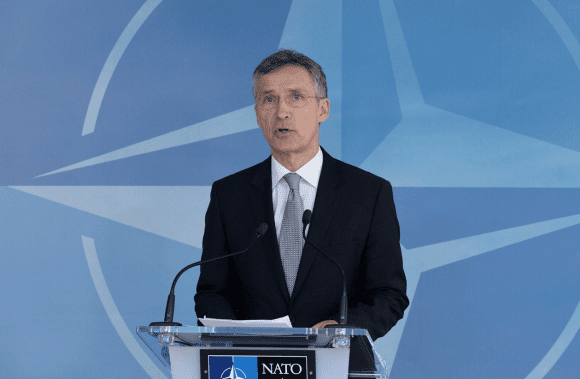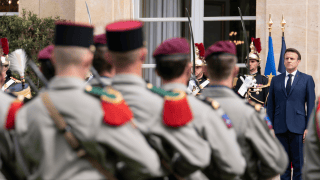- WYWIADY
- ANALIZA
Prof. Kroenig for Defence24: NATO Must Elevate Nuclear Deterrence. Key Role for Poland
Moscow relies on nuclear threats to divide the NATO alliance, deter and coerce NATO members from challenging Russia, and, if necessary, it is prepared to conduct so-called “de-escalatory” nuclear strikes in order to avoid losing a conventional war to NATO. NATO needs to develop, therefore, a more robust nuclear deterrence policy and capabilities to counter Russian nuclear coercion and deter limited Russian nuclear strikes. (…) I believe Poland will play a central role in NATO nuclear strategy going forward (…) - as it was stated by Matthew Kroenig, an Associate Professor of Government and Foreign Service at Georgetown University in Washington DC.
Currently, security within the Euro-Atlantic sphere is threatened both by the aggressive policy implemented by Russia, as well as by the lack of stability in the Middle East, including terrorist activities and refugees inflow to Europe.What are the most important challenges for NATO, also within the context of the upcoming Warsaw summit, Professor?
As we know, NATO currently faces two main problems. First, the threat on the southern flank posed by ISIS and the influx of refugees. The second problem comes from the East and the renewed Russian threat against NATO.
Obviously, both those areas are important, but in my opinion the Russian Federation poses a greater challenge. Any conflict with Russia has the potential to escalate into a major war that could pose an existential threat to NATO members. Also, if NATO were to fail to respond to an attack on a member state, the Alliance could collapse altogether.
ISIS is, without any doubt, also quite dangerous, but it does not pose the same kind of existential threat to NATO members of the alliance as a whole.
Coming back to the meeting of the NATO leaders in Warsaw, what goals should be set by the current US Administration, within the scope of the activities undertaken within the NATO framework?
Ideally, NATO would be adopting a new Strategic Concept at the Warsaw Summit. The entire strategic environment has fundamentally changed since the last concept was released in 2010 and NATO needs a new concept that better fits current realities. Realistically, however, it will not be possible for NATO to adopt a new SC before the Warsaw Summit, so more minor adjustments are needed. First, NATO needs to increase conventional forces, including heavy armour and anti-tank weapons, on the Eastern Flank to deter a Russian invasion. In addition, NATO should take a number of steps to strengthen its nuclear deterrence posture and remind the world and Russia that NATO remains a nuclear alliance and that any nuclear attack will be met with a nuclear response.
In the discussion covering the expansion of the Russian nuclear capabilities, a question arises, regarding the NATO nuclear deterrence capabilities. How do you assess the current capacities and what role is going to be ascribed to this area of NATO activities in the future?
For the last 25 years, NATO has had an official policy of de-emphasizing the role of nuclear weapons in security policy and, if it were up to us, we would continue with this policy. We must also be realistic about the nuclear strategy and capabilities of rival states, however, and over this same period of time, Russia has increased, not decreased, the influence of nuclear weapons in its military strategy and doctrine. Moscow relies on nuclear threats to divide the NATO alliance, deter and coerce NATO members from challenging Russia, and, if necessary, it is prepared to conduct so-called “de-escalatory” nuclear strikes in order to avoid losing a conventional war to NATO. NATO needs to develop, therefore, a more robust nuclear deterrence policy and capabilities to counter Russian nuclear coercion and deter limited Russian nuclear strikes.
What are the sources of weakness of contemporary NATO, specifically within the scope of nuclear deterrence?In what areas, immediate improvements would be required, within the scope of forces and means?
First, with a nuclear threat at its doorstep, NATO must again elevate nuclear deterrence as a core mission within the Alliance. It can do this in public strategy documents and statements, through exercises, and nuclear signalling in crises.
Second, it must make sure that it has the capability to respond to a limited Russian nuclear “de-escalation” strike. At present, the only nuclear capability that NATO, as an Alliance (opposed to the nuclear capabilities of NATO’s nuclear armed member states), possesses are B61 gravity bombs delivered by dual-capable fighter aircraft. But given the most likely conflict zones in Eastern Europe and developments in Russian air defences, these weapons are becoming less useful, if not irrelevant. If NATO wishes to have a credible nuclear capability, it needs a standoff nuclear weapon that can penetrate Russian air defences. In a new report with the Atlantic Council, I recommend the development of a nuclear-armed AGM-158 JASSM, short-range cruise missile.
The NATO Nuclear Sharing problem has been recently vividly discussed within the Polish public sphere.What role is played by Warsaw, within the NATO’s tactical nuclear weapons system?
I believe Poland will play a central role in NATO nuclear strategy going forward for three reasons. First, I and others have recommended forward-basing NATO nuclear weapons further East in Europe to be closer to likely conflict zones and Poland would be possible location for these capabilities. Polish pilots have already participated in NATO nuclear exercises in fighter escort roles. Moreover, Poland is already acquiring JASSM missiles and F-16 fighters, so, if NATO were to develop a nuclear JASSM, Poland would make sense as a host..
Second, as mentioned above, if Russia were to find itself on the losing side of a conventional war with NATO, it might resort to limited nuclear strikes in an attempt to force NATO to sue for peace? Where would Russia direct such strikes? It would likely target NATO forces, ships, or bases, possibly in Poland or other parts of Eastern Europe.
Third, if NATO’s leaders do feel the need to use nuclear weapons to retaliate against a limited Russian nuclear strike, then where will that strike be directed? If they do not have the ability to penetrate Russian air defences, or if they wish to avoid escalation, they might be tempted to use nuclear weapons on Russian forces in NATO territory. In my view, this would be a mistake. How would the Polish people feel if NATO decided to conduct a nuclear attack on Russian forces in Poland? It would be much better, in my view, to develop a penetrating nuclear capability.
So, in the light of the above, do NATO and the United States have to bolster their military presence on the Eastern Flank? Here I mean primarily the Baltic States, considered to be most prone to the potential attack?
Rather than face some of the frightening conflict scenarios outlined above, including possible nuclear exchange, it would be much better to deter crises before they begin. This means NATO must have an adequate conventional force posture to Putin from challenging NATO. A recent study by the RAND Corporation, an influential think tank in Washington, found that it would only take two or three days for Russia to conquer the Baltic States.
This is unacceptable.
The report recommended deploying a heavy brigade in each of the three Baltic States. This amount of force would still not be enough to prevent a Russian invasion, but it should be enough to raise the cost of war and serve as a potent deterrent.
We are nowhere near three heavy brigades in the Baltics currently, but we need to get there before it is too late.
What is the meaning of the incidents taking place over the Baltic Sea, involving the Russian military aircraft?Just recently, Russian bombers made a simulated attack run against a US Navy destroyer, while Su-27 fighters were aggressively manoeuvring in the direct vicinity of the RC-135 reconnaissance aircraft.
Russia’s goals in these incidents are clear. It is playing a game of brinkmanship, raising the risk of an accidental crisis in an attempt to cow NATO and deter it from countering Russian ambitions.
NATO can use diplomacy to establish rules of the road to reduce the risk of an accidental confrontation. More fundamentally, however, NATO must strengthen its deterrence posture and capabilities to demonstrate consistently that it will not back down in the face of Russian coercion.
Most of those situations are taking place close to the Polish border, a Polish Navy helicopter was stationed on-board the US Navy destroyer.What is the Warsaw’s role in the current security architecture, within this part of Europe.
Contrary to what one might expect, I see Poland as one of the most important European states in NATO. Poland, along with the Baltic States is on the frontlines of the Alliance. But Poland is also a large power, with significant territory and military capabilities and an increasing defence budget. Moreover, there is a significant overlap of interests between Warsaw and Washington on how to address the Russian threat.
In sum, therefore, I believe that Poland is among the most important members of NATO.
Matthew Kroenig is an Associate Professor of Government and Foreign Service at Georgetown University in Washington DC. He also works as a Senior Fellowat the Brent Scowcroft Centre on International Security atthe Atlantic Council. Dr. Kroenig is an expert, well-reputed in the United States, dealing with national security, strategy and policy and international relations. Professor Kroenig also worked as a foreign policy adviser for Mitt Romney, Republican candidate for the US Presidency in 2012. Between 2010 and 2011 Kroenig worked at the Defence Secretary’s office, as a special adviser dealing with the issues related to Iran. The interview was conducted during the Matthew Kroenig’s visit to the Adam Mickiewicz University of Poznan.
















